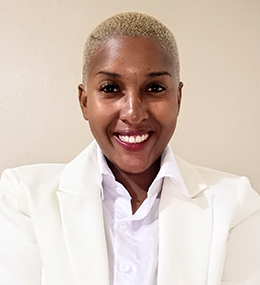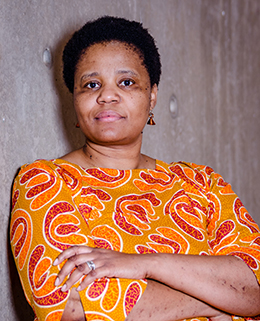News & Events
The Love Jones Cohort: Single and living alone in the black middle class
The Department of Leadership and Transformation (DLT) recently hosted a conversation with Professor Kris Marsh, Department of Sociology, University of Maryland, on her new book The Love Jones Cohort: Single and Living Alone in the Black Middle Class, which was facilitated by Console Tleane, Director of Systems and Policies, DLT.

Professor Kris Marsh
In his official opening, Tleane explained that the conversation was about Marsh's new book and her observations and experiences while researching and writing the book, which was a journey of seven years.
Marsh stated that The Love Jones Cohort centred around black people aged between 25 and 54, single and never married, who may or may not live alone but not with a romantic partner and do not have children (SALA).
"One of the things I grappled with while I was writing the book is whether or not I wanted to talk about people who are single and living alone as SOLO because you have that book by Eric Klinenberg." She added: "When I wrote the book, I called them SALA, Single and Living Alone. I did not want to change it to SOLO because I thought SOLO did not consider race. SALA allows us to have a race conversation. The Love Jones Cohort is specifically for black middle-class people that are SALAs," explained Marsh.
The book explores the scholarly debates on defining the black middle class, the rise of never-married black singles, how these black adults define family and friends, and decide on whether and how to pursue romantic relationships, articulate the ebbs and flows of being black and middle class, select where to live and why, accumulate and disseminate wealth, and maintain overall health, well-being and coping mechanisms.
Lesego Plank, a researcher at the Chief Albert Luthuli Research Chair at Unisa, responded to the presentation by stating that the book identifies a cohort that challenges the idea that marriage is a prerequisite for a middle-class existence. The book demonstrates how the social institution in the US is evolving, and this trend is not only in the USA as we are finding ourselves in South Africa within various entities asking ourselves whether a marriage has become an "out of fashion'' institution, as South Africa has seen a decline in marriage rates. "Could this indicate that the institution of marriage is fading away? "asked Plank.

Lesego Plank
The Love Jones Cohort makes the case that one of the results of this decline is the increase in black singles, especially under the black middle class. Economic, demographic, societal or cultural factors may be to blame for the decline in marriages; in addition, these factors may shed some light on the systematic challenges that the cohort experiences in finding spouses and growing black families. The book tries to show how structural forces constrain personal choices no matter how one approaches singlehood; through an intersectional lens or not, it is also crucial to understand that for many people, being single is informed by intersecting and marginalised identities. These characteristics are sometimes seen as a flaw, especially by single women or as an ephemeral stage associated with negative characteristics like laziness or indifference. These presumptions limit our ability to comprehend how the overlapping identities of The Love Jones Cohort influence their way of life and choices.
"This book is challenging society to stop stigmatising single people, asking us why we are single as we do not ask married people why they are married, for society to stop calling women derogatory terms like 'lefetwa,' a Sotho word signifying one who has remained behind while other women are married or 'inyumba,' a Zulu word meaning a childless woman," said Plank.

Professor Grace Khunou
Professor Grace Khunou, Director of Scholarship, DLT, also responded: "The Love Jones Cohort reflects that the experiences that lead to singleness for the black middle class are structural, and I was excited about that as I have always looked at the black experience from that lens." Khunou argues that people, particularly scholars, need to engage with everyday issues from the perspective that the black middle class has structural challenges and that we cannot be simplistic in our analysis. We must ask pertinent questions like why middle-class women cannot find a suitable partner. Is it because of the high unemployment rate? Is it because there are a lot of socio-economic challenges, or is it how society defines what it is to be a man?
Marsh shares in her book that singlehood might look differently for black people in countries where they do not form the majority globally and in the USA compared to the dominant group, in this case, white people. The structural challenges are not only in the countries where white people are in the numerical majority. South Africa, where black people are the numerical majority, still has similar structural challenges. Where black people find themselves, irrespective of their numerical numbers, experiencing these structural challenges because the systems we find ourselves in do not reflect our cosmologies and histories. We, therefore, need to reflect on how we think about intimate relationships and how we are influenced by ideas that are not African or speak to what it means to be black in the world.
Marsh is a Professor of Sociology at the University of Maryland, and her general areas of expertise are the black middle class, demography, racial residential segregation, and education. She has combined these interests to develop a research agenda divided into three broad areas: the black middle class, the intersection of educational attainment and racial identification, and intra-racial health disparities. The common theme in her work is decomposing what it means to be black in America by focusing on intra-group variability regarding class, space, identity, educational achievement, and mental health.
*By Gugu Masinga, Marketing and Communication Specialist, Department of Leadership and Transformation
Publish date: 2023/04/24
